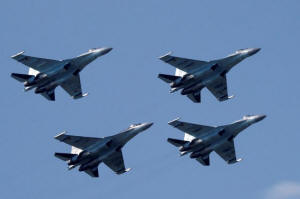|
U.S. sanctions China for buying Russian
fighter jets, missiles
 Send a link to a friend
Send a link to a friend
 [September 21, 2018]
By Lesley Wroughton and Patricia Zengerle [September 21, 2018]
By Lesley Wroughton and Patricia Zengerle
WASHINGTON (Reuters) - The Trump
administration imposed sanctions on the Chinese military on Thursday for
buying fighter jets and missile systems from Russia, in breach of a
sweeping U.S. sanctions law punishing Moscow for meddling in the 2016
U.S. election.
In Beijing, the Chinese government expressed anger and demanded the
sanctions be withdrawn.
The U.S. State Department said it would immediately impose sanctions on
China's Equipment Development Department (EDD), the military branch
responsible for weapons and equipment, and its director, Li Shangfu, for
engaging in "significant transactions" with Rosoboronexport, Russia's
main arms exporter.
The sanctions are related to China's purchase of 10 SU-35 combat
aircraft in 2017 and S-400 surface-to-air missile system-related
equipment in 2018, the State Department said.
They block the Chinese agency, and Li, from applying for export licenses
and participating in the U.S. financial system.
It also adds them to the Treasury Department's list of specially
designated individuals with whom Americans are barred from doing
business.

The U.S. also blacklisted another 33 people and entities associated with
the Russian military and intelligence, adding them to a list under the
2017 law, known as the Countering America's Adversaries Through
Sanctions Act, or CAATSA.
CAATSA also seeks to punish Russia for its aggression in Ukraine and
involvement in Syria's civil war.
"China expresses strong indignation at these unreasonable actions by the
U.S. side and has already lodged stern representations," Chinese Foreign
Ministry spokesman Geng Shuang told reporters in Beijing, adding the
moved seriously harmed bilateral relations and military ties.
"We strongly urge the U.S. side to immediately correct the mistake and
rescind the so-called sanctions, otherwise the U.S. side will
necessarily bear responsibility for the consequences," he said, without
giving details.
China has "normal" military exchanges and cooperation with Russia, aimed
at protecting regional peace and stability, which is not against
international law or aimed at any third party, Geng added.
China will continue to work with Russia to promote strategic cooperation
at an even higher level, he said.
Doing significant business with anyone on the U.S. blacklist can trigger
sanctions like those imposed on China.
Some of those added to the list, which now contains 72 names, were
indicted in connection with Russian interference in the 2016 U.S.
election, a U.S. official said.
President Donald Trump on Thursday issued an executive order intended to
facilitate implementation of the sanctions.
A federal special counsel is leading a criminal investigation of Russian
interference in the U.S. election, and any possible cooperation with
Trump's presidential campaign.

Trump has insisted there was no collusion with Russia. Moscow denies any
effort to meddle in U.S. politics.
AIMED AT MOSCOW - OR BEIJING?
One U.S. administration official, who briefed reporters on condition of
anonymity, said the sanctions imposed on the Chinese agency were aimed
at Moscow, not Beijing or its military, despite an escalating trade war
between the United States and China.
"The ultimate target of these sanctions is Russia. CAATSA sanctions in
this context are not intended to undermine the defense capabilities of
any particular country," the official told reporters on a conference
call.
[to top of second column]
|

Sukhoi Su-35 multi-role fighters of the Sokoly Rossii (Falcons of
Russia) aerobatic team fly in formation during a demonstration
flight at the MAKS 2017 air show in Zhukovsky, outside Moscow,
Russia, July 21, 2017. REUTERS/Sergei Karpukhin/File Photo

"They are instead aimed at imposing costs upon Russia in response to its
malign activities," the official said.
In Moscow, Russian member of parliament Franz Klintsevich said the
sanctions would not affect the S-400 and SU-35 deals.
"I am sure that these contracts will be executed in line with the
schedule," Klintsevich was quoted as saying by Russia's Interfax news
agency. "The possession of this military equipment is very important for
China."
Security analysts in Asia said the move was largely symbolic and would
only push Moscow and Beijing closer together.
"The imposition of U.S. sanctions will have zero impact on Russian arms
sales to China," said Ian Storey, of Singapore's ISEAS Yusof Ishak
Institute.
"Both countries are opposed to what they see as U.S. bullying and these
kind of actions will just push Beijing and Moscow even closer together,"
he said, adding that Moscow needed Chinese money and Beijing wanted
advanced military technology.
Collin Koh, a security analyst at Singapore's S Rajaratnam School of
International Studies, said the sanctions would do little to counter the
evolving research and development relationship between China and Russia.
China relies less on large big-ticket purchases from Russia, but Chinese
defense industries are seeking expertise from Russia and former-Soviet
states to plug knowledge gaps, he said.

The Trump administration is pursuing strategies to clamp down on China
and faces growing pressure to respond strongly to U.S. intelligence
agency reports that Russia is continuing to meddle in U.S. politics.
Members of Congress, including many of Trump's fellow Republicans, who
passed the sanctions bill nearly unanimously, have repeatedly called on
the administration to take a harder line against Moscow.
Administration officials said they hoped the action against EDD would
send a message to others considering buying the S-400.
U.S. officials have been discussing the issue particularly with NATO
ally Turkey, which wants to buy the Russian-made S-400 surface-to-air
missile batteries.
Washington has expressed concern that Turkey's planned deployment of the
S-400s could pose a risk to the security of some U.S.-made weapons and
other technology used by Turkey, including the F-35 fighter jet.
U.S. officials have warned that Turkey's purchase of the system could
contravene CAATSA.
"We hope that at least this step will send a signal of our seriousness
and perhaps encourage others to think twice about their own engagement
with the Russian defense and intelligence sectors," another U.S.
official said.
(Reporting by Lesley Wroughton and Patricia Zengerle, additional
reporting by Polina Devitt in Moscow, Ben Blanchard in Beijing and Greg
Torode in Hong Kong; Editing by Lisa Shumaker and Darren Schuettler)
[© 2018 Thomson Reuters. All rights
reserved.]
Copyright 2018 Reuters. All rights reserved. This material may not be published,
broadcast, rewritten or redistributed.
Thompson Reuters is solely responsible for this content. |